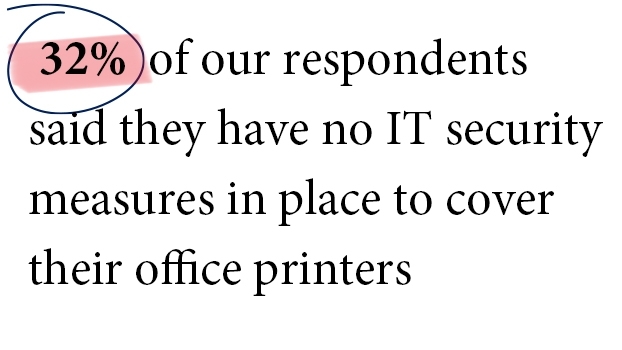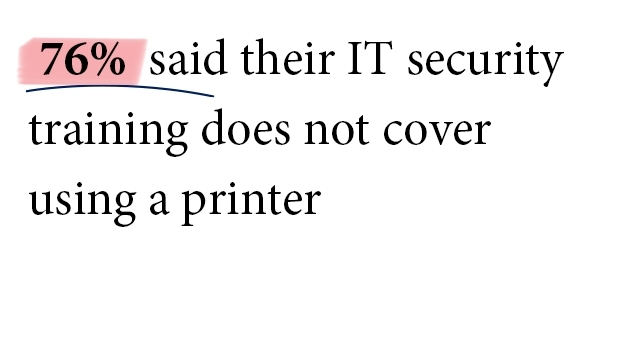Real businesses, real threats
In today's interconnected digital landscape, cyber attacks are on the rise. From data breaches to ransomware, the ever-changing cyber crime threat landscape has left individuals, organisations, and businesses grappling with uncertainty. Many are confused about where the real cyber security threats are, with some unsure of how best to protect their business.
To get a clearer picture of cyber protection today, Sharp surveyed 5,770 European IT decision-makers working in small and medium-sized enterprises (SMEs) in a range of industries including charities, construction, education, finance, healthcare, and logistics. We asked our IT leaders about their cyber protection confidence levels and their security challenges, as well as their plans and priorities.
Uncovering some fascinating insights, our research shows that many IT leaders are rightly concerned about cyber attacks. Indeed, over a third (36%) of our respondents said IT security was one of their biggest challenges for the next 12 months. But what are the real risks and real-world ramifications of cyber attacks today? And what can businesses do to protect themselves from cyber security threats and cyber crime, and stay cyber aware?

How common are cyber attacks?
Time and time again, news of cyber attacks hit the headlines. Back in 2022, a ransomware group launched a major cyber attack on Thales, a French defence and aerospace company selling radars, drones, and military satellites – resulting in a massive leak of sensitive information on the dark web. More recently, a cyber criminal group attacked the MOVEit file transfer software. This also resulted in a data breach but, this time, BBC and British Airways employees had their personal details leaked.
For SMEs, monitoring cyber security threats might not be top of the priority list. After all, major cyber attacks don’t happen every day, and when they do, the news typically highlights how they affect larger organisations.
But in reality, cyber attacks affect businesses of all sizes. Our research shows that one third (33%) of European businesses have been impacted by a computer virus attack. On top of this, studies have found that small businesses are more frequently the target of cyber crime.

68% of IT leaders lack confidence in their businesses' ability to deal with IT security risks
According to our research, over two-thirds (68%) of IT leaders lack confidence in their businesses' ability to deal with IT security risks. This could be for many reasons but may be because they aren't covering some basics in their digital defence. After all, cyber attacks can come from areas you may not have previously thought about – for example, the humble office printer.
But when it comes to robust cyber protection, it’s essential not to overlook the importance of commonplace office devices. As our research highlights, printers are a common target for those engaged in cyber crime, with almost one-fifth (19%) of our respondents saying they have been impacted by a printer-related security breach. At the same time, only 5% of our respondents said they are worried about a printer security breach.
While the vast majority of IT leaders are cyber aware, businesses in general clearly misunderstand the cyber security threats posed by printers. Sadly, cyber criminals can and do leverage this misunderstanding to gain access to sensitive data, connected computers, and networks.



IT leaders’ top three concerns are losing money, losing customer confidence, and negative brand impact
When asked what impact they thought an IT security breach, if significant, would have on their business, our IT leaders' top concerns were losing money, losing customer confidence, and negative impact on the brand.
Of course, these are all valid concerns. After all, the consequences of a cyber attack can be severe. For example, businesses in the education or healthcare industries store a lot of personal data. If a data breach happens as the result of a cyber attack, not only would customers lose trust, but there is the real possibility of regulatory fines too.
For other industries, the risk might not seem so bad. For example, construction businesses don’t store as much sensitive data – at least not when compared to healthcare or education. For this reason, construction businesses might not have very strong cyber protection policies or data privacy policies. Unfortunately, this is something that actually makes them more vulnerable to cyber attacks in the first place.
Ultimately, all SMEs need to be cyber aware and have robust cyber protection in place. This is because SMEs in every industry can be susceptible to cyber attacks, particularly ransomware attacks. These are often enabled as a result of phishing (deceptive emails encouraging individuals to reveal sensitive information), vishing (deceptive phone calls), or smishing (deceptive text messages).

Real risks, real solutions
For every real risk out there, there’s a real solution to help keep the business protected.
This can be something as simple as regularly updating software – including operating systems, applications, scanners, and printers. Regular updates help to secure systems and devices by fixing vulnerabilities which can be exploited those engaged in cyber crime.
Regularly backing up critical data is also essential, as it ensures that, in case of a cyber attack or a data loss incident, businesses can restore their operations and minimise downtime.
On top of this, it’s crucial that teams are on the same page when it comes to the company policy on cyber crime and cyber security threats. Whether employees are working from home, on-site, or on the go – the same security standards and procedures need to be followed. Employee training should encourage the use of strong passwords and multi-factor authentication (an extra identification step) and include guidelines for handling sensitive information. When done correctly, cyber protection training ensures employees are the first line of defence against potential attacks.

Do you have the right cyber protection?
In today's increasingly complex digital landscape, it’s never been more important to keep business information protected. But without the right cyber protection in place, SMEs run the risk of being vulnerable.
Thankfully, there are real solutions that can help SMEs stay safe. For example, Sharp offers a comprehensive family of tailored security solutions to help SMEs counter cyber attacks and foster a more secure working environment. With help from Sharp, SMEs can protect themselves against cyber attacks and overcome their cyber protection issues, wherever and however employees are working.

Interested in cyber protection?
Want to know how to protect your business from cyber attacks?
Explore the Real World Security hub to find out about cyber security threats.

